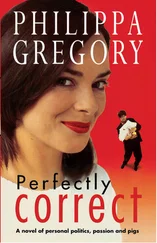“Anything else new?” Lambert asked as they walked from the rare garden to the stable yard where John had halted the cart.
“I brought you some day lilies and some white lilies, and there are a couple you could use in your orange garden: a red lily and a flame lily. They could pass for orange and you could breed from them, selecting the most orange colors.”
Lambert nodded to his man to unload the cart.
“I hear you are much at home these days,” John said tactfully, skirting the gossip that Lambert’s differences with Cromwell now amounted to an open breach. The rule of the major generals had been replaced by a new parliament which again had failed to agree. Lambert had once more been spokesman for the radical old soldiers of the army who still resisted every attempt to restore the gentry and the lords to their previous power. There was a great suspicion that Cromwell, in an effort to secure peace in the country, was going the way of the Stuart kings, James and then Charles, toward a parliament which served only lords and gentry, an imposed Church which served the needs of the one sole ruler: himself, who might even be called king.
John Lambert had brought a petition from the army to Parliament voicing the old demands of free elections, justice for all, and a fairer chance for working men, as if the Levelers still held the balance of power and could make such demands. He expected a fair hearing from Cromwell, who had once been an army man, as Lambert was still.
But Cromwell was an army man no more. He had moved from the clear, godly certainties of the ranks to the complex machinations of the men of power. When Lambert brought the petition asking for the political changes that the army had fought and died for, Cromwell acted swiftly. He reorganized the army, paid some back wages, promoted some men, dismissed others, and broke whole companies. Lambert had to watch the radical leaders of the army posted to service overseas, Jamaica, or Ireland, or simply discharged from their posts.
Then the blow fell on him. Cromwell dismissed Lambert from his own regiment, from the men that had fought behind him every step of the king’s wars and had never been separated from their commander before. Lambert had taken the order without argument from Cromwell, because he would not disobey his commander. But he would not take the oath of fealty to him. And he did not admire Cromwell when the republican leader appeared in the robes of state carrying a scepter.
Lambert scowled for a moment at John, hardly seeing him. “I am much at home,” he agreed. “As it turns out, I have little choice. There’s no place for me at Westminster, it seems. And no place for me with my regiment. It’s been given to Lord Fauconberg.”
“Your regiment?” John asked.
Lambert nodded, scowling.
“Who is Lord Fauconberg? I’ve never heard of him.”
“A noble lord. A royalist who has become Cromwell’s man. I think my regiment is his dowry,” Lambert said wryly. “He’s to marry Oliver’s daughter Mary. Quite a little dynasty that Cromwell is making, isn’t it? And with a man who was a royalist, and would be a royalist again, especially if his father-in-law was to be king.”
“I never thought he could govern without you,” John volunteered. “I never thought he would turn against the army.”
“He’s become nervous,” Lambert explained. “He doesn’t want a parliament full of new ideas, he doesn’t want an army that might argue with him. So he dissolved Parliament and took my regiment away from me.”
“Could you not have objected?” John asked. “Surely you command more influence than him, especially in the army.”
Lambert gave a rueful smile. “And do what?” he asked. “Lead them out to fight him? Another war fought over the same ground with the same men? Another half-dozen years of heartbreak? I’m not a man for faction, or division. My task has been to pull the country together, I wouldn’t tear it apart for my own ambitions. I promised that I wouldn’t raise a storm against him if he left my regiment alone, in one piece. I traded: my work and reputation for the integrity of my men. Cromwell agreed. They’re under another man’s command but no good men have been thrown out in the street for thinking for themselves. It was a fair deal, and I have to stick to my side of the contract.”
“I couldn’t believe they were talking of Cromwell for king,” John said. “I thought that we were building a new country here, and now it seems that we were just exchanging one king for another. The family of Stuart for the family of Cromwell.”
“The person doesn’t matter,” Lambert said staunchly. “Nor the name. What matters is the balance. The will of the people in Parliament, the reform of the law so that everyone can get justice, and the limitation of the king – or Lord Protector – or Council of State. It doesn’t matter what the third power is called, but everything has to work in balance. The one with the other. A three-legged stool.”
“But what will you do if the Lord Protector doesn’t want to be in balance?” John asked. “What if he wants the balance tipped all his way? What if the milkmaid on your three-legged stool is thrown down and all the milk spilled?”
Lambert looked at the orange trees in their carrying tubs without really seeing them. “I don’t know,” he said. “We shall have to pray that he has not forgotten so much of what we all once wanted.” His mood suddenly changed and he grinned at John. “But I’m damned if I call him Your Majesty though,” he said cheerfully. “I swear to you, Tradescant, I just couldn’t do it. It would choke me.”
Frances and Alexander stayed at the Ark for the spring. Alexander’s cough was no better and Frances wanted him away from the smell and noise of the city streets.
John woke one night to hear him coughing in their room and heard Frances go quietly down the stairs. He slipped from his own bed, threw his cape around his shoulders over his nightshirt and went downstairs to the kitchen.
Frances was stirring a saucepan over the embers of the fire.
“I’m making a drink of mead and honey for Alexander,” she said. “His cough is so troublesome.”
“I’ll put a drop of rum in it,” John said, and went to fetch the bottle from the cupboard in the dining room. When he came back he saw that Frances had sunk into one of the kitchen chairs with the saucepan left on the hob. He took it off and poured a hearty slug of rum on the mix, and then poured it into a cup.
“Taste it,” he said.
She would have refused but he insisted.
“Very sweet,” she said.
“Take another gulp,” he said. “It’ll put some spirit in you.”
She did as she was ordered and he saw the color come into her cheeks.
“I am sorry,” he said.
She met his eyes frankly. “He’s sixty-seven,” she said bluntly. “We’ve had twelve good years. We never counted on this many.”
John put his hand over hers.
“And you never wanted me to marry him at all,” she said with a flash of residual resentment.
John smiled wryly. “Only to spare you this night,” he said. “And the other nights ahead, while you nurse him.”
She shook her head. “I don’t mind,” she said. “I’m caring for him now, but he has cared for me for as long as I can remember. I quite like being the one in charge for a change. I like repaying the debt of love. He’s always petted me, you know. Petted me so tenderly. I rather like nursing him now.”
John poured a little thimbleful of mead and rum for her. “You sit by the fire for a while and drink this,” he ordered. “I’ll take this up to him.”
Frances nodded and let him go. John took one of the kitchen candles, lit it at the embers of the fire and went quietly up the stairs to Alexander’s bedroom.
Читать дальше
Конец ознакомительного отрывка
Купить книгу












